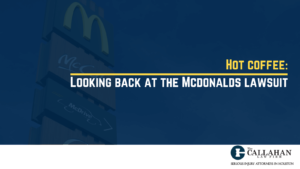Hot Coffee: Looking Back at the McDonalds Lawsuit

It was the coffee spill reported around the world.
Twenty five years ago, a 79-year-old woman named Stella Liebeck bought a cup of coffee to go at a McDonald’s drive-through in Albuquerque, New Mexico and spilled the coffee on her lap.
She sued McDonald’s, and a jury awarded her almost $3 million, prompting a media frenzy and a lot of criticism in the court of public opinion.
“Isn’t coffee always hot?”
“Maybe she should have been more careful!”
The reactions go on and on, but as is usually the case, there is much more to the story, so much more that there’s even a documentary, fittingly called “Hot Coffee.”
Not only did the case inspire a documentary, it was also used as a textbook example for lobbyists trying to get legislation passed to put a cap on jury awards and limit “frivolous” lawsuits.
Here are some facts you might not know about the famous “hot coffee case”:
- The elderly woman was not driving when the coffee spilled. She was in the passenger seat, and the car wasn’t even moving. It was stopped in the parking lot.
- The coffee was more than hot. It was, according to expert testimony, “dangerously hot,” so hot that the sweatpants she was wearing absorbed the coffee and caused third-degree burns — the most severe kind.
- Mrs. Liebeck had to have skin grafts on her thighs and other parts of her body.
- Before the Liebeck case, more than 700 people had reported injuries from the dangerously hot coffee that McDonald’s was serving. The corporation had paid settlements in some cases.
- Mrs. Liebeck initially offered to settle the case for just $20,000 — enough to cover her medical bills and loss of income. McDonald’s would not budge with a higher offer than $800. That’s why the case went to trial.
- McDonald’s admitted in court that the company knew about the risk of injury by serving coffee that hot — between 180 and 190 degrees Fahrenheit — for more than 10 years and never did anything about it.
- McDonald’s quality assurance manager testified at trial that McDonald’s coffee, at the temperature at which it was poured into Styrofoam cups, was not fit for consumption because it would burn the mouth and throat.
- Not only did McDonald’s fail to change the temperature requirements for franchises, the corporation also failed to warn customers about the potential risks. The company did not say why it did not warn customers.
- The jury didn’t award the multi-million-dollar verdict for actual damages, i.e. lost income, lost quality of life, medical bills, etc. The big award was for punitive damages — to punish McDonald’s as a corporation for a policy that injured hundreds of people and the company’s unwillingness to change the policy of serving “dangerously hot” coffee.
- The judge on Mrs. Liebeck’s case reduced the jury’s punitive award from $2.8 million to $480,000.
- Mrs. Liebeck did not receive the full amount of the award approved by the judge. She ultimately agreed on a confidential settlement amount from McDonald’s to avoid the lengthy appeals process.
This painful and more-complicated-than-most-people-think story demonstrates that that civil lawsuits brought on behalf of consumers are not always frivolous, and almost always, there is much more that the jury gets to hear than the general public.
If you or someone you love has been injured because of a faulty product, you need to consult with an experienced products liability attorney. Contact us today for help.

Michael S Callahan is an attorney and founder of The Callahan Law Firm. He focuses his practice on representing individuals and families in personal injury cases involving motor vehicle and truck accidents, workplace accidents and defective products. With over 25 years of experience, he is dedicated to fighting on behalf of people whose lives have been forever altered by the negligence and carelessness of corporations and individuals. Originally trained as a mechanical engineer, Michael has been practicing law and fighting for justice for those who need it most since 1994. He is board-certified in Personal Injury Trial Law by the Texas Board of Legal Specialization and a member of various esteemed legal associations. Outside of work, Michael enjoys spending quality time with his family, outdoor activities, and continually striving to improve as a trial lawyer and human being.











